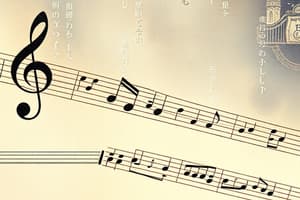Podcast
Questions and Answers
What is melody in a musical piece?
What is melody in a musical piece?
- Combination of pleasing tones moving at different speeds and pitches (correct)
- Combination of random tones moving at the same speed and pitch
- Combination of random tones moving at different speeds and pitches
- Combination of unpleasant tones moving at different speeds and pitches
What are the call letters of the lines and spaces in a staff known as?
What are the call letters of the lines and spaces in a staff known as?
- Staff labels
- Tone titles
- Pitch names (correct)
- Note designations
What are the notes represented by the lines on the G-clef?
What are the notes represented by the lines on the G-clef?
- E G B D F (correct)
- F A C E
- G B D F A
- D F A C E
What is the purpose of ledger lines in music notation?
What is the purpose of ledger lines in music notation?
What does the clef sign on the left side of the staff indicate?
What does the clef sign on the left side of the staff indicate?
Flashcards
Melody
Melody
A combination of pleasing tones that move at varying speeds and pitches, creating a musical phrase or idea.
Pitch Names
Pitch Names
The names given to the lines and spaces on a musical staff, representing specific pitches.
G-Clef Line Notes
G-Clef Line Notes
The notes represented by the lines are E, G, B, D, and F.
Ledger Lines
Ledger Lines
Signup and view all the flashcards
Clef Sign
Clef Sign
Signup and view all the flashcards
Study Notes
Melody in Music
- Melody is a sequence of musical notes that are perceived as a single entity.
- It typically consists of pitch (the highness or lowness of notes) and rhythm (the timing of the notes).
- Melodies are foundational to songs and are often memorable hooks that carry the main theme.
Call Letters of Staff Lines and Spaces
- The call letters for the lines and spaces of a staff are known as "staff notation."
- For the treble clef (G-clef), the lines from bottom to top are E, G, B, D, F.
- The spaces in the treble clef correspond to the notes F, A, C, E.
G-Clef Line Notes
- The notes represented by the lines on the G-clef, or treble clef, are E, G, B, D, F.
- These notes serve as fundamental reference points for musicians reading music written in treble clef.
Purpose of Ledger Lines
- Ledger lines extend the staff to accommodate notes that fall outside the conventional five-line arrangement.
- They are used to notate very high or very low pitches that cannot be represented on the standard staff.
- Each ledger line provides a clear indication of the pitch and maintains the relative spacing of notes.
Clef Sign Indication
- The clef sign located on the left side of the staff indicates the pitch range of the notes that will be represented.
- Common clefs include treble (G-clef) and bass (F-clef), which define specific note placements on the staff.
- The clef determines which notes correspond to which lines and spaces, guiding musicians in their reading of the music.
Studying That Suits You
Use AI to generate personalized quizzes and flashcards to suit your learning preferences.




